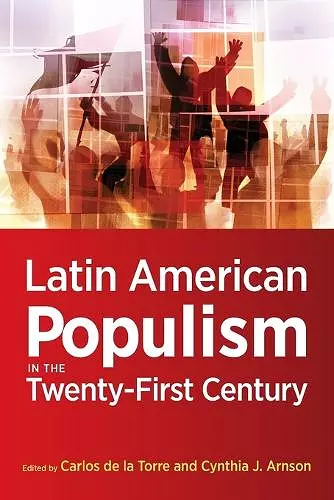Latin American Populism in the Twenty-First Century
Carlos de la Torre editor Cynthia J Arnson editor
Format:Paperback
Publisher:Johns Hopkins University Press
Published:9th Jul '13
Currently unavailable, and unfortunately no date known when it will be back

This is an excellent edited volume on populism in Latin America, one that nicely updates the scholarly literature on the region. It facilitates a much broader scholarly conversation that is long overdue and provides a timely description of all of the best-known, recent populist movements in the region, while situating these in a longer trajectory of populism. -- Kirk A. Hawkins, Brigham Young University De la Torre and Arnson bring together an outstanding cast of contributors to examine the causes of populism and its various-and double-edged-consequences for democracy. More than any other book on the subject, Latin American Populism in the Twenty-first Century spans historical eras, from the 'classical' populism of the 1930s and 1940s, to 'neoliberal' populism of the 1990s, to the more radical forms of populism that emerged in the contemporary era. For this reason, it is likely to be of enduring value for students of Latin American politics. -- Steven Levitsky, Harvard University Latin American Populism in the Twenty-first Century does a remarkable job in providing a fresh perspective on one of the region's most recurrent and controversial political phenomena. Its breadth of theory and empirical case studies mean that it will be a must-read not only for researchers interested in populism, but also for anyone interested in the politics of the poor and marginalized more generally. -- Philip Oxhorn, McGill University
By analyzing the discourse and policies of populist leaders and reviewing their impact in particular countries, these contributors provide a deeper understanding of populism's democratizing promise as well as the authoritarian tendencies that threaten the foundation of liberal democracy.Venezuela's Hugo Chavez, Bolivia's Evo Morales, and Ecuador's Rafael Correa have brought the subject of Latin American populism once again to the fore of scholarly and policy debate in the region. "Latin American Populism in the Twenty-first Century" explains the emergence of today's radical populism and places it in historical context, identifying continuities as well as differences from both the classical populism of the 1930s and 1940s and the neo-populism of the 1990s. Leading Latin American, U.S., and European authors explore the institutional and socioeconomic contexts that give rise to populism and show how disputes over its meaning are closely intertwined with debates over the meaning of democracy. By analyzing the discourse and policies of populist leaders and reviewing their impact in particular countries, these contributors provide a deeper understanding of populism's democratizing promise as well as the authoritarian tendencies that threaten the foundation of liberal democracy.
This volume uses a well-defined methodological approach that sets it off from the vast scholarly literature on the topic of Latin American populism... The volume's comparative approach, both in national and continent-wide contexts, leads to valuable insights that will most likely serve as points of reference for future research and debate. -- Steve Ellner Hispanic American Historical Review It is a must-read for both younger students and experienced academics because it manages to combine its informative aspects with concrete and in-depth theoretical and empirical analysis Political Studies Review
ISBN: 9781421410098
Dimensions: 229mm x 152mm x 25mm
Weight: 590g
416 pages